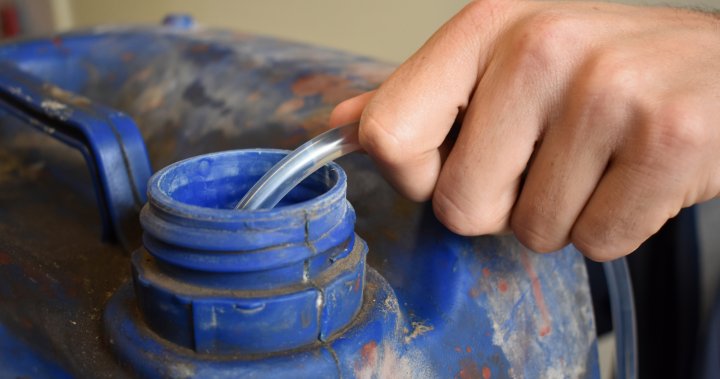Tips to guard yourself from gas theft as prices continue to climb – National | Globalnews.ca
As the price of gasoline continues to climb, it’s likely we’re going to face in increase in gas theft, too, experts warn.
But there are things you can do to protect yourself from getting hosed.
Sanctions against Russia have put pressure on the global oil supply, as countries begin to phase out or ban imports of Russian oil.
Read more:
Police, store owners prepare for ‘gas-and-dash’ thefts as prices continue to rise
In some parts of Canada gas has climbed to more than $2 per litre, according to gas-price tracking website GasBuddy.com.
Thieves, of course, are capitalizing on the increase and there have been reports of brazen gas theft taking place across the country.
Last week a Winnipeg daycare was left without transportation after enterprising thieves drilled holes in the fuel tanks of the centre’s transportation vans to steal the gas.
And less than a week later, Winnipeg’s Peg City Car Co-op was targeted in a similar way — the gas tank of one of their shared vehicles was discovered to have two small holes drilled into it.
A spokesman for the Ontario Association of Chiefs of Police told The Canadian Press last week that there’s “a national suspicion that some people may resort to (theft).”
“People’s budgets are really being pressed these days … it would not surprise us if some people, out of desperation or otherwise, resorted to this type of behaviour,” Joe Couto said, adding that his group plans to lobby the Ontario government for legislation that requires people to prepay before filling up – similar to what’s already in place in Alberta and B.C.
Read more:
Arnold Schwarzenegger makes impassioned plea to Russians: ‘This is an illegal war’
And while gas stations are worried about an increase in gas-and-dash crimes, authorities say individuals and their private vehicles are at higher risk, too.
The Elk Valley RCMP, in B.C., told CNN that there’s been an uptick in fuel theft reports, where pickup truck owners have reported their gas tanks drilled.
“Thieves are not just siphoning gas out of the tank, they are drilling a hole in the tank leading to an expensive repair,” Constable Debra A. Katerenchuk said. “The surging gas prices is one thing, but the cost to replace the gas tank is a lot more.”
Read more:
Gas station owners say thieves stole more than 4.5K litres of fuel
It’s not just Canadians that have been targeted by gas thieves. This week, two separate police forces in the U.S. — both in Washington state — shared tips on how citizens can protect themselves from fuel theft.
The Renton Police Department recommends investing in a locking gas cap, even if your vehicle already has a fuel door that locks.
They also recommend putting your car in a garage, if possible, or parking it in a well-lit, well-travelled location. They say parking so your fuel door is visible from a main road can also be a deterrent.
The department also says parking in a public place — like an airport parking lot or public parkade — for an extended period of time makes your car more vulnerable to theft. If possible, they recommend getting a ride to the airport or carpooling to work to cut down on the number of vehicles being left unattended.
The Hoquiam Police Department also recommends keeping an eye out for suspicious behaviour; someone walking around with a gas can and section of garden hose could be “a clue of possible gas theft,” they wrote in a Facebook post.
Automotive news website Roadshow shared additional tips.
In a YouTube video, they say parking in a private garage with key or swipe-card access is one of the best bets to preventing gas theft.
If you need to park in a public garage, parking near the exit or stairwell is the safest option, they say. They also recommend activating your car alarm whenever you leave your vehicle.
If you think you’ve been a victim of gas theft, it’s important not to drive your car to prevent further damage, reminds Roadshow.
Signs of a possible gas theft include:
- the smell of gas or diesel near your vehicle
- fuel puddled underneath your vehicle
- the fuel gauge is noticeably lower
- the vehicle fails to start.
— With files from Global News’ Sam Thompson
© 2022 Global News, a division of Corus Entertainment Inc.
For all the latest world News Click Here






